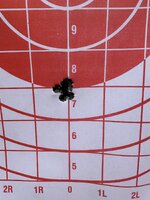This isn’t directed at you, since what you say makes sense, but I think a lot of people just aren’t used to how good some factory ammo can be. And more just don’t understand how little minor inconsistencies matter at normal hunting ranges. Are people justifiably worried that one shot is 3150, the next is 3191 and the next is 3110? I think not.
I am duly impressed by any shooter/rifle/ammo combination that can consistently produce 1-MOA 10-shot groups out to 500 yards.
The first batch of Frontier 5.56 I got had an SD of 12.3 over 40 rounds. And it was coming out 100 FPS faster than the box velocity from my 16.1” Tikka. The aggregate group for those 40 rounds was 1.2”. World class shooting? Hardly. But more than good enough for me. I can only hope that the second batch of that ammo is as consistently accurate. If it turns out to be great, maybe I will buy enough for a year or two? But there will always be an element of uncertainty. That uncertainty almost certainly won’t matter to most shooters at normal hunting ranges.
There’s always an experimental element to shooting and the law of diminishing returns always applies. Whether that is working up a new load or finding a good batch of ammo. I grew up reloading. I like reloading. But it’s not for everyone.
And I have come to believe that it doesn’t make sense for high volume non-professional shooters or low volume shooters. To me, reloading starts to make sense for a shooter who is firing at least 500 short, long, or magnum center fire shots a year. That’s enough volume to justify the initial expense of the equipment and probably enough practice to justify the pursuit of better accuracy. But once you start talking about spending more money on equipment and more time doing it, I think it’s better to outsource it.
If you aren’t going to burn an 8-pound keg of powder in a year or two, it’s probably not worth reloading (I get roughly 130-140 long action rounds per pound of powder).
Edit - but also… what is wasted about firing 20 rounds out of 200 to confirm group size or POI and then firing 10 more to confirm your new zero if you have to adjust?
You are mostly correct that at what I consider normal hunting ranges ES and SD don’t matter all that much. That said I do a lot of competition shooting, imo it’s the only way to really test yourself. In that setting it matters. There are plenty of guys on here playing in the world of long range hunting where half a mil matters.
1moa consistency isn’t the problem. 1moa precision is a whole different story. Shooting moa at 500 yards somewhere on paper is no different than shooting it at 100, assuming decently consistent conditions. Hitting a 5” plate at 500 yards consistently, becomes very difficult with even a whisper of wind. If we want to discuss hitting smaller targets even sub 600, then yes all this stuff matters.
Here’s one for you, last year I shot an nrl hunter match with factory Berger, from a tikka barreled action. Here’s an attached 10 round group I used to set my zero. This ammo was easily the most accurate factory ammo I have ever fired, it also had an ES of 90 for the 20 rounds I fired that day.

I used that combination at an nrl hunter event. One stage had targets at 950ish yards, don’t remember exactly. Assuming this rifle is .5moa accurate, which I already know I can’t do on the clock. I’m looking at 8.1-8.7 mils I’m my velocity window. .6mils of elevation difference throughout the day means missed targets potentially that I have zero control over. This is just one example of many. Guys winning these matches now a days are not missing many targets.
Regarding your batch of frontier, how many boxes do you have of that lot number? Because that’s all that data matters for. Your next lot could be 4moa and 100fps slower. 1.2” groups at your home range are only world class shooting on Rokslide.
I’m in a world where guys are shooting barrels out per year. Even a light year for me just shooting casual 1 day matches I have put 1200 rounds through one rifle since march. In a competitive rifle setting I wouldn’t even consider a 1.2-1.5moa rifle, it would just be frustrating. In a hunting scenario to the ranges I am confident to they are doable. That being said I am way more confident with my rifles that shoot better, and they give me more margin for error on my part, whether it matters or not is up to the individual.
I do agree reloading isn’t for everyone. For someone trying to gain more from their ammo it can be, if they are willing to invest in the equipment and the knowledge. For me it saves me thousands of dollars a year, but eats up significant time.

